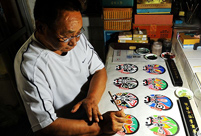 Ceremony volunteers for Youth Olympics make public appearance
Ceremony volunteers for Youth Olympics make public appearance
 A glimpse of female crew of Liaoning aircraft carrier
A glimpse of female crew of Liaoning aircraft carrier
 Stills from "Dad, where are we going?"
Stills from "Dad, where are we going?"
 Legless man's happy life
Legless man's happy life
 Top ten most beautiful islands in China
Top ten most beautiful islands in China
 Aerial view of Hong Kong
Aerial view of Hong Kong
 Happy life in Xinjiang
Happy life in Xinjiang
 2014 China Hainan Int'l Automotive Exhibition kicks off
2014 China Hainan Int'l Automotive Exhibition kicks off
 Collection of 'China Dream' public-spirited ads
Collection of 'China Dream' public-spirited ads
 The silent holy stones
The silent holy stones
BEIJING, July 18 -- China reaped a record harvest this summer, but experts are nevertheless worried about growing water scarcity and soil degradation behind the agricultural success.
The National Bureau of Statistics (NBS) announced earlier this week that the country's yields of summer grain crops, mainly wheat, grew 3.6 percent from last year to 136.6 million tonnes in 2014.
It is the 11th consecutive year of grain output increases, largely thanks to favorable weather conditions that resulted in a higher per-unit yield of wheat, said NBS senior analyst Huang Jiacai.
However, the feat cannot hide shortcomings in farming, including overuse of water, chemical fertilizer and excessive reclamation, in large parts of rural China, said Li Guoxiang, a rural development researcher with the Chinese Academy of Social Sciences.
The major areas producing summer crops, which account for about 20 percent of the country's annual grain output, are located in north and northwest China. These vast arid lands are plagued by over-pumping of underground water due to drought, Li said.
As the country is struggling to feed its 1.3 billion people, with a grain self-sufficiency rate of 97 percent in 2013, its chase for ever-higher production goals may worsen the resource shortage and environmental problems, he warned.
His concerns were backed up by Xinhua reporters' investigations in the provinces of Shandong, Heilongjiang, Shaanxi and Gansu.
This summer, Liu Qibiao in Shandong's Shanxian County reaped an additional 200 kg of wheat from his 0.66-acre farm compared with last summer, but did not earn more money.
To have a better harvest, Liu used two more bags of chemical fertilizer than usual and watered the plants more to ride out a mild drought in March, only to find that the output increase was offset by extra costs. "I worked harder, but wasn't well-rewarded," he lamented.
He said farmers in his village are facing grave challenges in irrigation. "In the past, our wells were only 20 to 30 meters deep. But now, you won't see water unless you dig at least 50 meters underground."
While there is less and less irrigation water available, many water conservancy facilities are too old or poorly maintained to properly function, according to Liu Junwei, deputy head of the agriculture bureau of Shannxi's Baoji City.
In addition, the heavy use of chemical fertilizer for decades, intended to ensure yields, has trashed soil fertility and raised food safety risks, said Jiao Jiang, chief economist of the Heilongjiang Academy of Agricultural Sciences.
Official data shows China's arable land, accounting for less than 10 percent of the world's total, consumes over a third of the world's chemical fertilizer.
With water and land resources sparse, experts have said the government must put more effort into boosting farming productivity and efficiency.
The central authorities have taken action. A guideline issued in December 2013 said that by 2020, China will develop 53 million hectares of "high-standard" farmland, characterized by low use of water and fertilizer, high yields as well as drought and flood resistance.
Although the central government has long promoted water-efficient farming, the practice has been far from popular, due to farmers' low awareness and financial pressure on local governments, Li explained.
"Most major grain producing counties are not rich," he said, suggesting the central government spend more on helping local governments build advanced irrigation systems and revamp water conservancy facilities.
Ma Zhongming, deputy head of the Gansu Academy of Agricultural Sciences, said the government should promote wider use of manure and the practice of turning crop stalks into fertilizer to restore land fertility.
China produces about 700 million tonnes of crop stalks, which can serve as perfect fertilizer after being buried deep in soil, said Ma. "Chinese farmers were still adopting the method to enrich soil up to 30 years ago, but the tradition has largely been scrapped here today."
 Moms on their kid’s coming out
Moms on their kid’s coming out Chinese fighters through lens
Chinese fighters through lens
 Children attend gymnastics training in summer
Children attend gymnastics training in summer
 Beautiful sceneries along the special travel route in Xinjiang
Beautiful sceneries along the special travel route in Xinjiang
 Beauty SWAT member in Xinjiang sparks online frenzy
Beauty SWAT member in Xinjiang sparks online frenzy
 Germany beat Argentina 1-0 to win World Cup
Germany beat Argentina 1-0 to win World Cup
 National fitness team members integrate traditional and modern beauty
National fitness team members integrate traditional and modern beauty Collection of 'China Dream' public-spirited ads
Collection of 'China Dream' public-spirited ads  How Chinese men kill the time when their wives practice square dancing?
How Chinese men kill the time when their wives practice square dancing? Top 10 most beautiful islands in China
Top 10 most beautiful islands in China
 Zhou Xun announces engagement to Archie Gao
Zhou Xun announces engagement to Archie Gao
 Photos of the Week
(July 6 - July 12)
Photos of the Week
(July 6 - July 12)
 'Super moon' seen in Beijing
'Super moon' seen in Beijing
 One-legged women with high heel goes viral on Internet
One-legged women with high heel goes viral on Internet China's largest 3D printer builds 2-meter-long boat
China's largest 3D printer builds 2-meter-long boat
Day|Week|Month